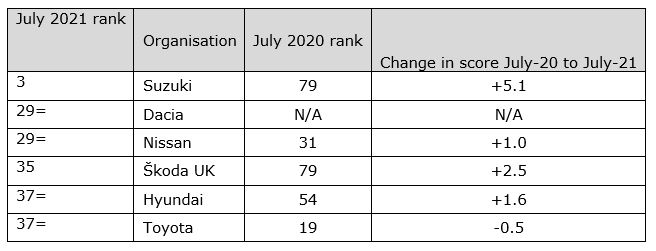The car retail sector’s customer service levels have delivered their worst ever score in The Institute of Customer Service’s (UKCSI) latest in-depth market research.
The number of UK customers experiencing service issues in the last six months has risen to its highest level since 2009, according to the organisation which polls 10,000 consumers every six months.
And UKCSI chief executive Jo Causon said that consumers are growing impatient with the excuse that service shortcomings are “because of COVID”.
“Organisations must not hide behind this blanket statement,” she said.
But as car retail groups across the UK battle to placate customers unable to access new cars quickly due to the impact of a semiconductor supply shortage on new car deliveries and catch-up with outstanding aftersales work, Marshall Motor Group CEO told AM employees were “doing a great job” amid surging consumer demand.
And, overall, car retail was the fourth highest-ranked retail sector out of 13 categories.
UKCSI said the past year had seen the proportion of in-person experiences in the automotive sector fall to 41% compared to a year ago, as the sector was hit by a series of COVID-19 lockdowns.
The combined number of phone (20.4%), website (18%) and email experiences (14.8%) grew to over 50%, however, placing strain on businesses often battling against resource issues as staff members were furloughed.
The UKCSI survey, which tracks the effects of customer service on business performance, found 12.8% customers of the automotive sector experienced problems with a brand’s customer service in the period – the highest level ever recorded for the sector and 0.7ppts more than a year ago.
It found that the leading cause of customers’ problems is the quality or reliability of goods/services, with 41.5% experiencing a problem – higher than the UK average of 35.7%.
Suzuki, Dacia, Nissan, Skoda and Hyundai were among the car brands that consumers rated most highly for their levels of service in te latest UKCSI survey as all five improved their ratings.
 But consumers are calling on automotive companies to improve their websites and improve the knowledge of its staff – also making it easier to reach the right representative for help – in a bid to rectify some of the issues encountered.
But consumers are calling on automotive companies to improve their websites and improve the knowledge of its staff – also making it easier to reach the right representative for help – in a bid to rectify some of the issues encountered.
Causon said: “We are at a critical juncture for the UK economy. As we emerge from the COVID-19 pandemic, customers have become ever more discerning with where they spend their money and it is critical that automotive organisations in particular, pay close attention to their full service offering.
“Whilst we have seen improvements in complaint handling, it is evident that too many brands are failing to get to grips with the root causes of their customer service issues.
“Customer satisfaction is intrinsically linked to strong business performance. For the UK economy to move forward as a true service leader, we need a broader focus on all dimensions of the customer experience.”
The sector is also under strain as used car stock turn risks consumer disappointment amid soaring demand and new car lead times continue to grow.
Recently asked by AM regarding growing evidence that the car retail sector is struggling to answer high levels of consumer enquiries in the post-lockdown period, Marshall boss, Dash Gupta conceded that the levels of demand had proved a challenge.
He said: “I think the issue is that demand is very high right now and the people in the showrooms are very, very busy. They’re doing they’re best, they’re doing a great job.
“We have seen a little bit of a drop-off in response times. Being candid, that isn’t something I like to see, but the performance of the business shows how much work is being done.
“I think part of the issue is that those of the showroom floor are under a lot of pressure right now.”
UKCSI found that the three leading issues that customers believe organisations in the sector should improve are: website navigation; making it easier to contact the right person to help; and developing more knowledgeable staff.
Causon suggested omnichannel retail should be harnessed to ease the burden on front-line staff.
She said: “The past year has transformed the customer experience landscape. As attitudes, behaviours and preferences continue to evolve, it’s more important than ever for automotive brands to adopt a true omnichannel strategy; blending the best elements of digital and human experiences to engage with a diverse and fragmented customer base.”
